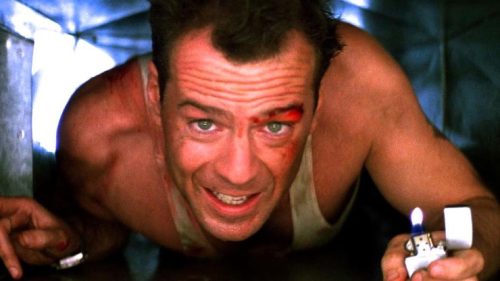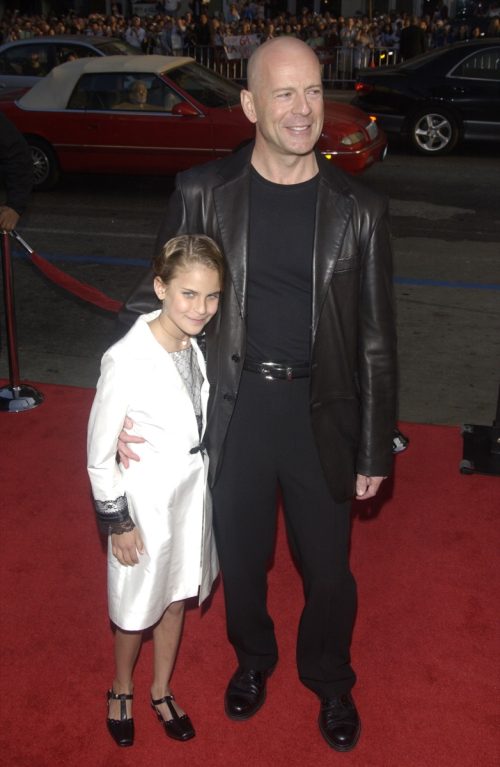Bruce Willis’ Daughter Reveals Early Dementia Signs the Family Missed

When it was announced in March 2022 that acting legend Bruce Willis was retiring due to an aphasia diagnosis—later revealed to be frontotemporal dementia (FTD)—fans everywhere mourned along with his family.
FTD, which has no treatment or cure, accounts for about 10 to 20 percent of dementia cases, the Mayo Clinic says. The cognitive condition can cause its victims to lose their ability to use language appropriately, they note, and may also cause “dramatic changes” in personality.
It wasn’t either of these symptoms, however, that Willis’ family first noticed. The actor’s daughter Tallulah Willis recently revealed in an essay for Vogue that years before the dementia diagnosis, her dad displayed some worrying behavior that his loved ones dismissed as something else. Read on to find out what it was, why Tallulah herself missed those early signs, and how the beloved star is doing now.
READ THIS NEXT: Bruce Willis’ Wife Just Gave a Heartbreaking Update on Life After His Aphasia Diagnosis.
A “vague unresponsiveness” was the first sign something was wrong.

“I’ve known that something was wrong for a long time,” Tallulah told Vogue, explaining that her father’s illness “started out with a kind of vague unresponsiveness.” In the heartbreaking essay, she says she thought his disinterest in her was due to his remarriage and the two young daughters he had with his wife, Emma Heming Willis. (Tallulah is the second of Willis’ three daughters with first wife Demi Moore.)
“I’m not beautiful enough for my mother, I’m not interesting enough for my father,” Tallulah, now 29, remembered thinking as an adolescent. “This couldn’t have been further from the truth.”
The family thought “Hollywood hearing loss” was to blame.

At first, Tallulah told Vogue, the family chalked Willis’ unresponsiveness up to what she calls “Hollywood hearing loss” from years of working on loud movie sets. “‘Speak up! Die Hard messed with Dad’s ears,'” she remembers being told. All the time, however, “my dad was quietly struggling.”
Tallulah recalls that although her father was undergoing “all kinds of cognitive testing,” no one knew what was wrong. “We didn’t have an acronym yet,” she said.
This isn’t unusual: According to the Mayo Clinic, FTD “can be especially challenging to diagnose early” because its symptoms “often overlap with those of other conditions.”
READ THIS NEXT: 4 Common Medications That Spike Your Dementia Risk, According to a Pharmacist.
Tallulah was dealing with her own health struggles at the time.

Meanwhile, Tallulah herself was dealing with health challenges that made it difficult for her to focus on her famous father’s decline. “The truth is that I was too sick myself to handle it,” she said, explaining that for years, she’s struggled with anorexia nervosa—one of the most common types of eating disorders, according to the American Psychiatric Association. In the spring of 2022, she said, she weighed just 84 pounds.
“I was always freezing. I was calling mobile IV teams to come to my house, and I couldn’t walk in my Los Angeles neighborhood because I was afraid of not having a place to sit down and catch my breath,” she told Vogue. “What if my dad had been his full self and saw me at that size? What would he have done? I’d like to think that he wouldn’t have let it happen.”
After spending time at a recovery center in Texas, Tallulah said she is now on the mend: “Recovery is probably lifelong, but I now have the tools to be present in all facets of my life, and especially in my relationship with my dad. In the past I was so afraid of being destroyed by sadness, but finally I feel that I can show up and be relied upon.”
For more health news sent directly to your inbox, sign up for our daily newsletter.
Her dad still “lights up” when she enters the room, Tallulah said.

These days, Tallulah told Vogue, she spends time taking “tons of photos” at her dad’s house and saves every one of his voicemails. “I’m trying to document, to build a record for the day when he isn’t there to remind me of him and of us.” Willis still recognizes her, she said, and he “lights up when I enter the room.”
She went on to note that unlike people with Alzheimer’s disease, those suffering from FTD often continue to know who their loved ones are. “At least early in the disease, [FTD] is characterized by language and motor deficits, while [Alzheimer’s] features more memory loss,” she explained.
“I have hopes for my father that I’m so reluctant to let go of,” Tallulah said. “I’ve always recognized elements of his personality in me, and I just know that we’d be such good friends if only there were more time. He was cool and charming and slick and stylish and sweet and a little wacky—and I embrace all that. Those are the genes I inherited from him.”
Best Life offers the most up-to-date information from top experts, new research, and health agencies, but our content is not meant to be a substitute for professional guidance. If you have health questions or concerns, always consult your healthcare provider directly.
- Source: https://www.mayoclinic.org/diseases-conditions/frontotemporal-dementia/symptoms-causes/syc-20354737
- Source: https://www.mayoclinic.org/diseases-conditions/frontotemporal-dementia/diagnosis-treatment/drc-20354741
- Source: https://www.psychiatry.org/patients-families/eating-disorders/what-are-eating-disorders